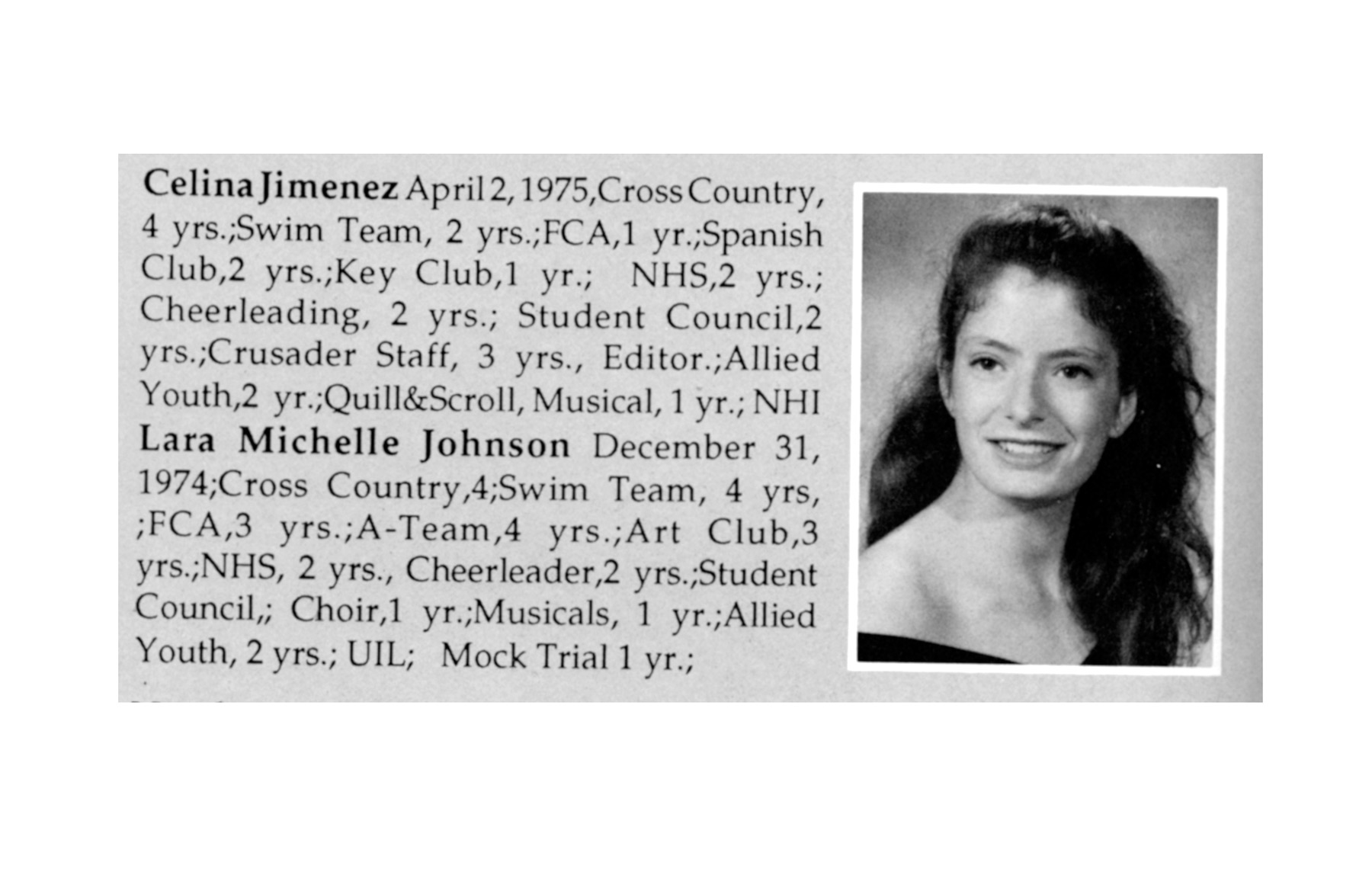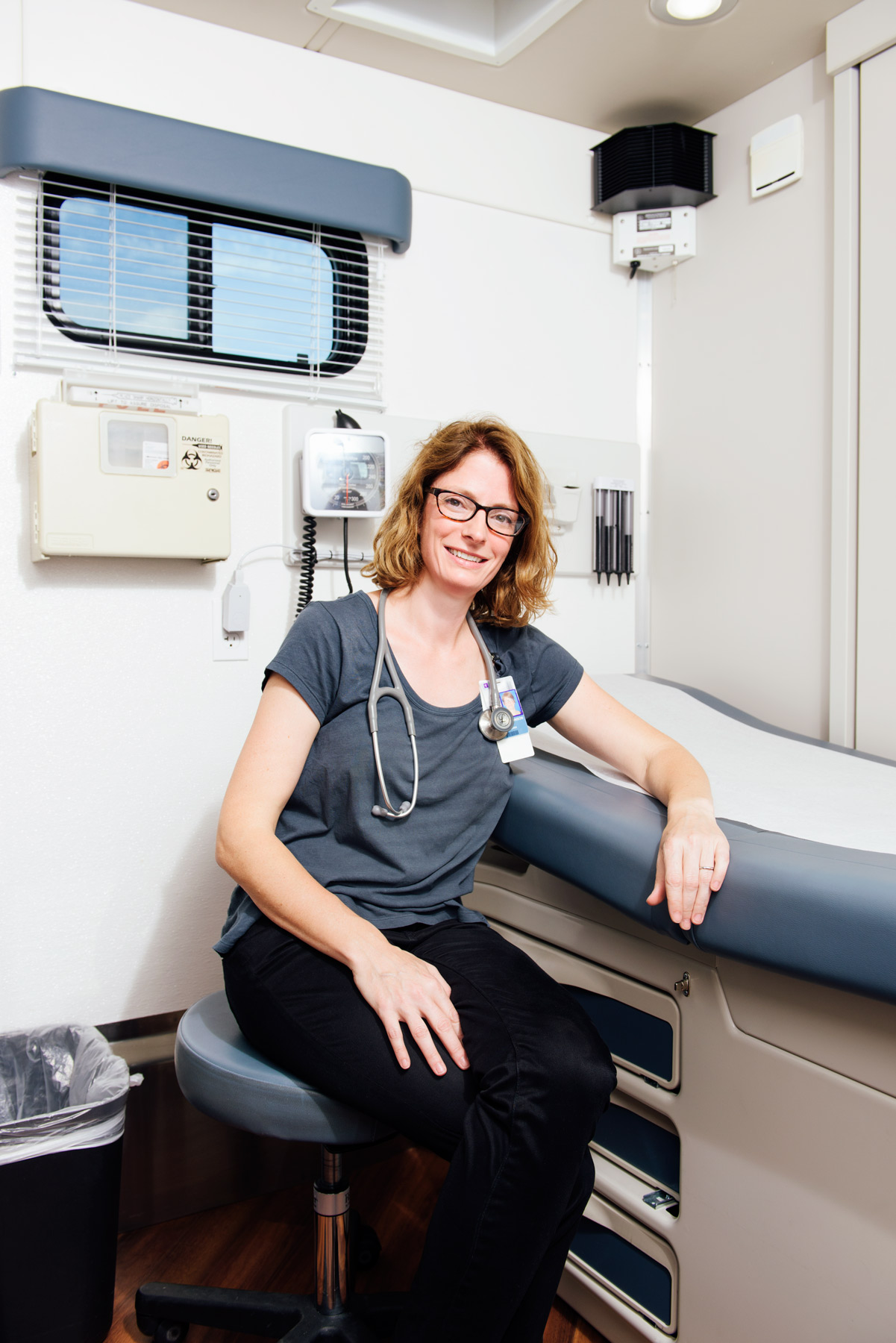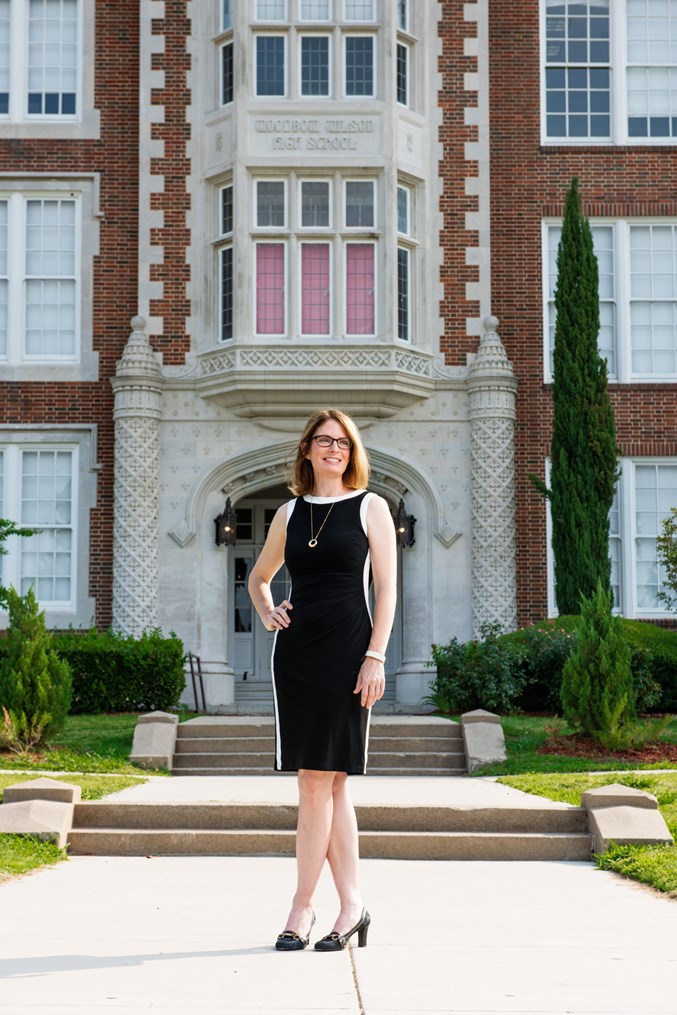Lara Johnson pulled her Toyota Highlander off Forest Lane one Thursday afternoon. Why she chose that moment, just after replacing her driver’s license and just before picking up her two children, she couldn’t say. What she was about to do was something she had thought about for years.
In a strip-mall parking lot, she got out her phone and typed a name into Whitepages, just as she’d done dozens of times. Only this time, she actually dialed the number. The telephone rang. And rang again. Three, four, five rings. No one answered, and she felt relieved. Then someone picked up. “Hello?”
“I’m looking for Pat Faherty,” she said.
“This is Pat Faherty.”
“This is Lara Johnson. From Woodrow Wilson High School, class of 1993. I’ve been thinking about you a lot.” Lara fought to hold her voice steady. “Yeah,” Lara continued, “I’ve really been meaning to call and say thank you.”
When Lara hung up, she sat quietly for several minutes. Then she steered her SUV back onto the tree-lined streets of North Dallas. She pulled into the entrance of The Lamplighter School, one of the most exclusive and expensive private elementary schools in Dallas. She traveled around a circular drive, past a wooden windmill and large barn, through the shade of large oak trees.
She took her place in the carpool line, her Toyota one of the more modest cars in a line of shiny Lexuses and BMWs. She spotted her two children, toting their Lands’ End backpacks, smiling as they walked toward her car.
It was another day in a life that still surprises Lara, the way it’s surprising when you’ve fallen asleep somewhere and it takes a moment to remember how you got there. She grew up in a different world, one of wanting things and not having them.
Most people don’t travel from that world to this one. And if it weren’t for the woman she’d just spoken to, in a call she’d put off for nearly two decades, Lara might not have been able to leave that world, either. Even now, all these years later, she sometimes felt like an immigrant from a faraway land, struggling to adapt to life in a foreign place.
•••

One evening after drinking too many Coors Lights, her father pistol-whipped her mother. Two-year-old Lara and her sister spent the night in an emergency shelter. Her parents divorced, and she stayed with her mother.
When her mother went in search of heroin, she took Lara along. Her mother would tell her to get down on the car’s floorboard and wait. Lara spent hours staring up at trees and streetlights.
Lara went with her mother on shoplifting trips. Sears was a favorite stop, for Craftsman tools that were easily pawned. Once, when Lara was about 6, an employee chased them into the parking lot, shouting for them never to return. His eyes lingered on Lara, in a way she understood to mean he was shouting at her, too.
It wasn’t that her mother didn’t take care of her. On the contrary, Lara felt her mother’s love intensely. They slept in the same bed, an interlocking tangle of limbs and soft skin. But she was not the center of her mother’s world. That place was ruled by a dark need that, no matter how many times Lara hid on the floorboard, could never be fully satisfied.
The drug use made her mother sick. She got hepatitis C. She lost an eye. She once hit an artery while shooting heroin, and her left thumb turned black; she nearly lost that, too. Lara went with her to doctors’ appointments and hospital visits. She felt the sting of judgment. She could tell the doctors, authoritative in their white coats, looked down on her mother. Her mother often felt as if they wanted to punish her rather than help her.
There was one visit to Parkland Memorial Hospital that felt different. Her mother’s drug use had led to a fungal infection in her brain. On the eve of surgery, a young Parkland doctor arrived in her room. The doctor spoke to her mother as if she were his equal. He sat patiently and answered all her questions. Lara studied him. He made them both feel as if everything were going to be okay. She would never forget that.
At school, Lara wore thick glasses and mismatched clothes, and she smelled of her parents’ cigarette smoke. Kids teased her. But teachers seemed drawn to her, as if sensing her need, and Lara excelled. She felt safe at school, in its routine and structure. Lara’s mother seemed surprised at her daughter’s straight A’s. “You know I’ll still love you if you make C’s,” she said.
By the time Lara entered high school, her father had become a regular at Alcoholics Anonymous. Lara moved into his home in Lakewood. He would bring home bagels or cheese Danishes for breakfast after his AA meeting, and they would talk while she finished homework at the kitchen table.
At 17, Lara drove herself to Woodrow Wilson High School every morning in a paint-chipped gray Oldsmobile, a 1984 Delta 88 that coughed black exhaust. Its fabric roof was held up by staples.
During her senior year, Lara was one of the top students in the class, in competition with two others for valedictorian. Along with taking all AP and honors classes, she jumped hurdles on the track team, swam competitively, and earned a spot on the varsity cheerleading squad. Her parents couldn’t afford the several hundred dollars for uniforms; Uncle Jerry and Aunt Jane stepped in to help.
That was also when her father told her that he was dying of AIDS.
•••
Mrs. Pat Faherty didn’t take much note of the slim, brunette English student at first. Mrs. Faherty was not an overly maternal teacher. The petite woman with short gray hair paced back and forth beside the desks, her brown eyes peering from behind glasses. She did not gush over the complexities of James Joyce or William Faulkner, regulars on her AP English syllabus. She approached literature with practicality; she focused on the craft of writing. To succeed in any field, she believed, students needed to know how to construct paragraphs with clear arguments and, of course, impeccable grammar.
Early each fall, Mrs. Faherty required her students to write an autobiography. It was a valuable exercise for seniors, she thought, as they teetered on the threshold between teenager and adult. If the students didn’t know where they came from, they couldn’t know where they were going.
Year after year, Mrs. Faherty’s husband had watched his wife, usually stoic and matter-of-fact, become overwrought by the stories of her students. There were girls who had gotten pregnant and kids who were working full-time jobs to support their families. Mrs. Faherty’s husband had begun to gently inquire about the due date of these papers, trying to make sure he would be out of town on business when they came in.
That year, Mrs. Faherty settled into a large recliner in her bedroom to read the autobiographies. Lara’s essay began with a bit of dialogue, something like this:
“I am done. I will never do heroin again,” Mom said.
Even though I had heard the words dozens of times before, I always took them as gospel.
The essay surprised Mrs. Faherty. Many students had confided in her over the years about problems at home. But with all this girl had been through, it was amazing she’d done so well.
One day, Mrs. Faherty asked Lara to stay after class. Mrs. Faherty asked if she was okay, if there was anything she needed. Lara said she was fine, and that was that.
The class of 1993 continued its march toward tassels and gowns. Seniors prepared for the SAT and began writing college essays. Many asked Mrs. Faherty to write recommendations. But not Lara. Mrs. Faherty asked other teachers if they’d heard about the girl’s plans. Where was she applying? Who was writing her recommendations? Nobody knew. Sad as it was, one teacher told her, it didn’t appear Lara was going to college.
At school, Lara wore thick glasses and mismatched clothes, and she smelled of her parents’ cigarette smoke. Kids teased her. But teachers seemed drawn to her, as if sensing her need, and Lara excelled.
Mrs. Faherty knew most of the application deadlines had already passed. She drove home that afternoon and decided it was time to talk to her husband about Lara Johnson.
Lara parked her gray oldsmobile on the street outside Mrs. Faherty’s old Tudor house in East Dallas one afternoon that spring. She had no idea why the teacher had asked her over for lunch. Inside, Mrs. Faherty and her husband were waiting.
They settled on a couch in the living room, and Mrs. Faherty asked about Lara’s college plans. Lara said she hadn’t given it much thought. Her father was getting sicker, she explained. He’d vowed to stay alive to see her graduate from high school, but Lara didn’t know how much longer he would live. Her mother was still using heroin, and Lara felt it was her duty to take care of her. Besides, she had no idea how she would pay for school.
Mrs. Faherty said that she and her husband wanted to help. They would pay for Lara to go to college.
Lara began to cry. Mrs. Faherty pressed on. There were a few conditions, and Lara needed to make sure she could abide by them. First, she must go to school at least an hour away, so her mother couldn’t sabotage her chances. Second, she had to maintain at least a C average. Third, she couldn’t tell anyone what they were doing. And fourth, if she were able, later in life, she had to pay for someone else to go to college.
Lara told them she wanted their help, absolutely. But she was worried that all the application deadlines had passed.
“Colleges will want you,” Mrs. Faherty told her. “I will help.”
•••
In the following weeks, the teacher scheduled Lara for AP examinations and the SAT, covering all of the fees. She helped her gather recommendations and reviewed her essays. Sometimes Lara liked to daydream about what she might study, who she might become. A physical therapist, maybe?
No, Mrs. Faherty urged. Aim higher. A doctor. Lara was smart and could accomplish anything, she said. And she needed to think further down the road. She probably would have to take care of her mother someday, and a larger income could ease a lot of life’s pressures. Lara had no wealthy relatives to help her if she failed.
Lara stood before the class of 1993 in her cap and gown as valedictorian. One of the students she beat was headed to Princeton, another to Stanford. Lara had settled on Trinity University, a prestigious, private liberal arts school in San Antonio. Classmates voted her “Most Likely to Succeed.”
About a month after graduation, on Father’s Day, her dad died.

Lara pulled into the school, 117 acres of red brick buildings and oak trees. She watched mothers and fathers unpack cars filled with mini refrigerators and computers and new twin comforters with matching pillowcases.
Lara’s freshman roommate was kind, offering to share her computer and refrigerator. But later, when Lara suspected the roommate had an eating disorder, she couldn’t help thinking of even that as a disease of privilege. How nice for her, she thought, and then hated herself for thinking it.
She tried to find her place at the school, attending the weekly Disco and Donuts mixers on the Quad. But she felt she’d entered a strange world.
Lara declared her major—premed. In small classes, she sat with other students in semicircles, discussing literature and history. But she couldn’t relate to them. She doubted any of them knew their way around a methadone clinic. At Woodrow Wilson High, plenty of students had stories like her own. But not here.
In one of her classes, a freshman from Highland Park wrote a paper about the state’s Robin Hood public school funding plan. The state took money from rich school districts and redistributed it among poorer ones. The student complained that it had eviscerated his high school’s debate-team budget.
Usually quiet in class, Lara couldn’t hold in her anger. “Did you know that there were schools, like, 2 miles from you, that didn’t have enough textbooks?” she said.
As the weeks passed, Lara began to feel as if she would never fit in at Trinity. She wanted to move closer to home, to TCU in Fort Worth. The transfer was pushing one of the teacher’s rules—that Lara attend school at least an hour away from her mother. She called Mrs. Faherty.
•••
Mrs. Faherty knew how Lara felt. The teacher had grown up poor in West Virginia, the daughter of a coal miner. At 18, she married the son of a coal miner who’d just returned from a tour with the U.S. Marines. He enrolled in college with the help of the GI Bill. He encouraged his wife to enroll as well. He told her she was very smart. The nighttime janitorial job that he already had to help with his own tuition would also serve to help with her tuition.
But after her freshman year, she got pregnant. She dropped out of school and became a stay-at-home mother, raising three children. After the kids went off to college, she decided to go back, too. She had always loved literature. At 45 years old, she graduated from UT Dallas with a degree in English. She took a job teaching at Woodrow Wilson in 1985.
By that point, her husband owned a successful consulting firm. He made more than enough to move them into a tonier house in Preston Hollow or Highland Park. But they stayed where they were and remained frugal. The only things they spent extravagantly on were travel and books.
When Lara explained how she felt at Trinity, Mrs. Faherty understood. She agreed to a transfer.
Lara left for TCU and finished her freshman year there. She told Mrs. Faherty she liked it much better. She enrolled for the next fall semester, and Mrs. Faherty sent the school a check. Before Lara started her sophomore year, however, Mrs. Faherty received a refund in the mail. It was clear Lara had withdrawn. But there was no note, no explanation.
The teacher debated what to do. Should she call her? Try to change her mind? She decided against it. Lara was an adult now. And Mrs. Faherty had learned long ago that she couldn’t save them all.
•••
By the time Mrs. Faherty received that check, Lara was long gone. While working full-time in a bank that summer, she’d met a man. He was a recent medical school graduate. She packed her belongings and followed him east, to Memphis. The drive there was one of the most exhilarating experiences she’d ever had. She was 19 years old, leaving the only city she’d ever known, headed toward a new life.
Lara moved into her boyfriend’s duplex while he finished his residency. She enrolled in the University of Memphis in the fall of 1994, working a part-time job to pay the tuition. She was too embarrassed to tell the teacher what she’d done. Following a man to a different state—this seemed the type of situation the teacher had tried to help her avoid.
The years rolled on, and neither Lara nor Mrs. Faherty ever tried to reach the other.
In 1996, Lara and her boyfriend returned to Dallas. They married. Lara enrolled at UTA to finish her last two years of college. By that point she had gotten to know many of her husband’s friends from residency. She realized they were all smart, but not necessarily smarter than she was. During her senior year, she was accepted at UT Southwestern Medical School.
•••
Elizabeth Dodge met Lara during their first year of medical school. Elizabeth had grown up in North Dallas, the daughter of a lawyer, and attended the city’s elite private schools. She related to Lara in many ways—both were a couple years older than most of the students in their class. But Elizabeth could sense something different about her friend. Over time, she learned of Lara’s past. Elizabeth began to realize what set them apart.
One afternoon, an administrator paged Lara. Her mother had been admitted to the Psych ER at Parkland and was asking for Lara. Usually someone was admitted to the Psych ER when they were off their medications, acting crazy. Often they arrived through the hospital’s back door, in handcuffs, led by police.
“As far as I know, no one else in our med-school class was getting paged by Psych ER because their mom was in the Psych ER,” Elizabeth says.
As the students became residents, some treated patients at Parkland, the county’s hospital for the indigent. There, many became cynical. They began to see the same patients again and again, people who arrived drunk and homeless and used the emergency room for basic medical services. Every day society’s lowest rung paraded in, people who couldn’t seem to get their lives together. Some doctors acquired an us-versus-them attitude.
That didn’t happen to Lara, Elizabeth says. “I’m not saying she’s some kind of saint. She recognizes when people are full of s—,” Elizabeth says. “But from very early on, she had a lot of patience with people who had a lot of issues.”
Elizabeth came to realize that Lara understood those people arriving in the emergency room. She often seemed more at home among them than with her fellow students.
•••
“Good morning,” says lara one recent day, looking into the brown eyes of a young girl in a white t-shirt and shoes that sparkle. “I’m Dr. Johnson.”
This morning, Lara left her tidy brick ranch in North Dallas, buckled her two kids into their car seats, and kissed her husband, David Gerber, an oncologist, goodbye. He is her second husband; her first marriage ended halfway through medical school. She and David have been married for 10 years. Lara dropped the kids off at their private school, then headed east, toward Garland. She pulled up behind a long, Greyhound-style bus parked beside an emergency shelter for children.
The bus belongs to Parkland. Two examination rooms and a small nurse’s station fill its interior. The hospital has five buses that travel to shelters around town, treating thousands of homeless adults and children every year. This is where Lara works now.
Inside one of the exam rooms on the bus, Lara sits on a rolling chair. Her hair is swept into a bun. A stethoscope hangs from her neck. She studies the girl, who is holding her stomach, her face filled with tears.
“Hi, sweetie,” Lara says. “What’s going on today?”
Her stomach hurt all night, the girl says. It’s a common complaint from the children at Jonathan’s Place, many of whom authorities have removed from their parents in the past 24 hours. It’s the stress.
Lara begins filling out forms on her computer, taking in the girl’s story. Her mom was using drugs, stole a car, and got arrested. CPS had been involved ever since her aunt’s husband’s friend touched her last year.
Lara sighs, looks at the girl.
“Do you remember that?”
She nods.
“Are you feeling sad about that?”
She nods.
Lara looks her in the eye. “I’m sorry that happened to you.” The girl smiles, and Lara continues. “What grade are you in?”
“Fourth.”
“What’s your favorite subject?”
“Math.”
“Me, too.” Lara smiles. “At school, do you have an adult you can talk to?”
“Yes,” the girl replies. “My counselor.”
“Good,” Lara says. “All right, sweetie, I’m going to have you plop up on the table and we’re going to do your exam.”
She washes her hands with soap in a miniature sink, then walks over to the exam table to feel her stomach.
“Does that hurt?”
“Yes,” the girl says, the girl’s eyes watering more.
“Okay, I’m going to have the nurse check your urine for an infection.”
The girl nods. Lara steps back.
“Good luck, sweetie,” she says.
The girl hesitates, then moves forward and hugs her. Lara hugs back, closing her eyes.
•••
For years, Lara felt ashamed of not contacting her former teacher. She was 19 when she’d last seen Mrs. Faherty. Just a girl. Now that she was older, it weighed on her. So over the phone that Thursday afternoon, she had asked Mrs. Faherty for permission to visit.
Now Lara parks her car in front of the old Tudor in East Dallas. She sits there for a minute, butterflies in her stomach. She has thought about this moment so many times over the years. She’s always worried about how the teacher would receive her. Would she be angry that Lara fell out of touch? Think her ungrateful?
Lara steps out of the car. Holding an orchid from Central Market, she walks toward the door. There’s a garden by the porch, a mix of black-eyed Susans waving wildly beside prim rows of boxwood shrubs. A garden rock reads, “Housework makes you ugly. Gardening makes you beautiful.”
Lara rings the doorbell.
After a few moments, the door swings open. Mrs. Faherty looks remarkably the same. Short gray hair and glasses. She smiles.
“Is it okay if I hug you?” Lara asks.
“Of course.”
They head to the living room. Mrs. Faherty sits down in her old wooden rocking chair, surrounded by books, paintings, and photographs of her four grandsons. She’s 76 years old now, and this is where she spends her days.
Lara sits on the couch, the same spot where she sat almost two decades ago.
“The garden in your front yard—it’s beautiful,” Lara says.
Gardening is my passion, Mrs. Faherty says.
Lara explains that she’s a doctor now. She tells Mrs. Faherty about the bus. “It’s not for everyone, but I love it,” she says.
Lara tries to thank her former teacher for the gift she gave her.
“I’m glad we could help,” the older woman says.
As they talk, Lara feels herself relaxing. She doesn’t sense that Mrs. Faherty expects anything—or, for that matter, ever did. This woman to whom she owes so much just seems happy to see her.
They talk for an hour until the room falls quiet. It’s 3:15 pm. The children will be out of school soon.
Lara steps outside, into the sunlight. She starts her car and heads north, back toward her children’s school. She has a growing savings account for each of them, waiting for their college plans. And there’s a third account, waiting for a child not yet known to her.






